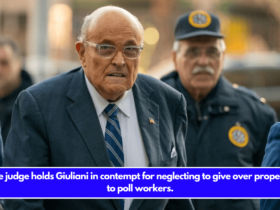When Canadian Prime Minister Justin Trudeau told Trump that his proposed tariffs would “kill the Canadian economy,” Trump suggested that Canada become the 51st state, according to Fox News, citing anonymous sources.
Trudeau met Trump at the president-elect’s Mar-a-Lago estate in Florida last week, after Trump threatened to impose a 25% tariff on Canadian and Mexican imports unless the countries reduced the number of migrants and narcotics entering the United States.
The United States is Canada’s largest commercial partner, accounting for roughly 75 percent of its exports. The countries presently trade under a largely duty-free agreement known as the United States-Mexico-Canada Agreement, which was signed into law by Trump and went into force in 2020.
On Monday evening, Fox News’ White House correspondent Peter Doocy told Special Report host Bret Baier: “We are told that when Trudeau told President-elect Trump that new tariffs would kill the Canadian economy, Trump joked to him that if Canada can’t survive without ripping off the U.S. the tune of one hundred billion dollars a year, then maybe Canada should become the 51st state and Trudeau could become its governor.”
Newsweek has asked Trump’s transition team and Trudeau’s office for comment via email.
Trudeau’s visit to Mar-a-Lago marked the first time a G7 leader had visited Trump since the November 5 presidential election.
On Saturday, Trump described the talks as “very productive” and stated that the men discussed fentanyl, illegal immigration, and trade.
Trudeau told reporters it had been a “great conversation,” and subsequently said on X (previously Twitter): “Thanks for supper last night, President Trump. I’m looking forward to working with you again.”
U.S. Senator-elect Dave McCormick, who won a tough election in Pennsylvania, posted a photo on Saturday of himself sitting at a table with Trump and Trudeau at the Mar-a-Lago meeting.
Howard Lutnick, Trump’s nominee for commerce secretary, North Dakota Governor Doug Burgum, who Trump has chosen to oversee the Interior Department, and Mike Waltz, Trump’s national security adviser, were all present at the table.
Dominic LeBlanc, Canadian Public Safety Minister, and Katie Telford, Trudeau’s Chief of Staff, were also spotted sitting around the table.
President Claudia Sheinbaum Pardo of Mexico also said that she and Trump had a good conversation on the phone on Wednesday, before Trudeau went to Mar-a-Lago.
“There is not going to be a tariff war,” Sheinbaum Pardo told reporters last Thursday at a press meeting. At the end of 2023, about 83% of Mexico’s exports went to the U.S.
However, Sheinbaum Pardo and Trump provided differing recollections of their conversation.
In a post on Truth Social, Trump stated that it was a “wonderful conversation,” that Sheinbaum Pardo promised to “stop migration through Mexico and into the United States, effectively closing our Southern Border.”
Sheinbaum Pardo later stated in a statement, “We reaffirm that Mexico’s stance is not to close borders, but to build bridges between governments and peoples,”
US President Joe Biden, who will be replaced by Trump in the White House on January 20, criticised the tariff measures during a Thanksgiving press conference in Nantucket, Massachusetts.
“I hope he reconsiders it, and I believe it is a counterproductive thing to do,” Biden said in response to a reporter’s inquiry. “The last thing we need to do is begin to screw up those relationships.”
Trump has also threatened to slap 100 percent tariffs on the nine countries that make up the BRICS trade coalition—Brazil, Russia, India, China, South Africa, Iran, Egypt, Ethiopia, and the United Arab Emirates—if they adopt a currency competing with the US dollar.
China has rebuked Trump’s warning. “The US has long used its dollar hegemony to shift crises, spread US inflation to other parts of the world, and turn it into a geopolitical tool that harms international economic and financial stability and disrupts international order,” Liu Pengyu, spokesperson for the Chinese Embassy in the US, told Newsweek on Monday.















Leave a Reply